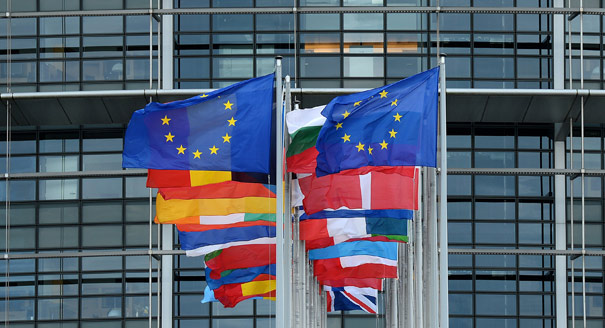What kind of foreign policy player is the European Union? Can one even still ask that question without everybody’s eyes glazing over? Is it not the quintessential Brussels bubble question, confirming that EU geeks are more interested in concepts and labels than outcomes? Perhaps.
And yet, against the backdrop of a European neighborhood that is coming apart at the seams, the U.S. strategic refocus on Asia, and a Russia that now defines itself against the West, this question is more pertinent than ever. Behind it lurks the one question that really matters: what do member states actually want the EU to deliver on foreign policy?
First, the EU is no longer a truly transformative power. Enlargement policy, which was the EU’s biggest transformational tool, might still bring a few more Balkans countries into the union but either has been largely mothballed as a strategic instrument or is dysfunctional, as in the case of Turkey.
The EU’s neighborhood policy, a hugely ambitious scheme to improve the politics and economics of countries on the continent’s southern and eastern edges, has been a spectacular failure. Despite great efforts made and large amounts of money spent, there is now less peace and less freedom in both regions. The exceptions to this pattern are scarce, and the prospects do not look good.
On top of all that, the EU’s considerable spending on development assistance shares its fate most Western aid efforts in the last 40 years: its impact has been a huge disappointment. Real meaningful change was, for the most part, generated by the liberal market forces of globalization and the exhaustion of conflicting parties, not by technical assistance projects administered by eurocrats.
Second, if the EU’s record as a transformative power is weak, perhaps the European project itself could serve as a model for others. Yet while elements of EU integration are carefully studied in Asia and Latin America, no other region in the world has emulated the European model of sovereignty bargains that are at the core of the integration project. Today, the EU’s internal weaknesses—laid bare by the euro crisis, lackluster growth, the surge of populist politics, a possible Brexit, and the failures in the field of migration—have severely eroded the EU’s soft power.
How about hard power, then? It is obvious that the EU is not a strategic military player, and neither are its member states, with the possible exceptions of France and the United Kingdom (both of which are significantly weaker now than they used to be). But where expeditionary capabilities are systematically being depleted, the ability to back up diplomacy and issue security guarantees to third parties is lost as well. As a result, geostrategic influence evaporates and the EU will remain an insignificant military player for some time to come.
Finally, is the EU an intellectual power? On this front, things look a bit better, but only a bit. Innovation in the fields of democracy promotion, comprehensive security, climate change, and economics tend to come from the United States and now, and more often, from recipient countries of aid themselves. The EU’s idea of “effective multilateralism” as a model for global governance was never more than a slogan and its modernization partnership with Russia remained powerless against the prevailing political culture in Moscow.
To sum it up: the EU is not much of a powerful foreign policy player at all. Yet there are a few recent exceptions that hint at what kind of player the EU could be. Whenever the EU was successful as strategic entity in world affairs, five factors were invariably in place:
- Far-reaching overlap of national interests among the member states;
- Bargaining power created by the ability to make attractive offers (such as market access or membership);
- Alignment with the United States as a diplomatic and military reserve power;
- A strong mandate to take action given to the EU institutions by the member states; and
- High-level political support for the institutions from the EU’s national capitals.
When all five elements are in place, successful EU foreign policy is possible, as was visible in the Iran negotiations, the agreements reached between Serbia and Kosovo, and the speedy creation of a fairly robust sanctions regime against Russia after the annexation of Crimea.
When these structural preconditions for a strong EU foreign policy are not in place, the EU remains a bystander at best. Unfortunately, this lucky alignment of factors is in place only very rarely and the true nature of the EU remains that of an occasional foreign policy player.
Those in charge of plotting the EU’s new foreign policy strategy should look out for issues where the five factors above are likely to converge. If these cases are put high on the priority list, a useful document could well emerge. The EU would still be an occasional power. But where there is a visible pattern, there can also emerge a path. It could well be the path to Strategic Europe.






.jpg)